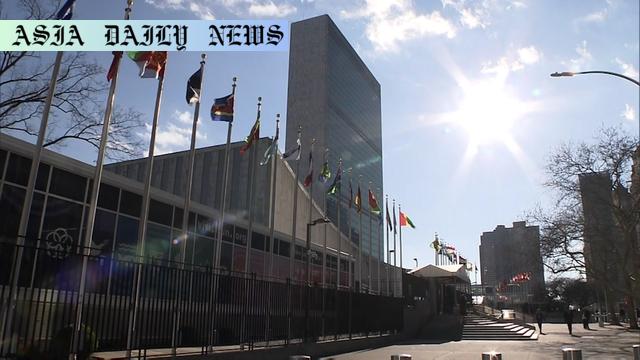Two-State Solution: Conference seeks global support for Israel-Palestinian peace through coexistence and independence.

Global Focus on Two-State Solution at UN Conference
The international conference dedicated to the two-state solution for the Israel-Palestinian conflict began with ambitious goals but faced a myriad of challenges. Held at the UN headquarters in New York, the gathering brought together delegates from 125 countries. France and Saudi Arabia were instrumental in calling for the conference, seeing it as an essential platform to bolster public and international support for a two-state proposal aimed at fostering peace and coexistence. The conference’s objective was clear: reignite hope and momentum for an enduring resolution.
Opening the session, UN Secretary-General Antonio Guterres spotlighted the reality of the current situation, describing the two-state solution as “farther than ever before.” Despite this recognition, Guterres reaffirmed its validity as the only framework rooted in international law and endorsed by the global community. The sentiment underscores the immense difficulty in progressing toward such a solution amidst ongoing tensions, political disagreements, and humanitarian crises.
Palestinian Perspective and Calls for Action
Palestinian Prime Minister Mohammed Mustafa spoke passionately, urging Israel to acknowledge and return to the principle of the two-state solution. He emphasized that the conference serves as a vivid message to Israelis: peace and integration within the region are achievable through Palestinian statehood and independence, not destruction. His plea reflected the broader Palestinian desire for legitimacy, security, and dignity in the face of continuous challenges.
The conference discussion topics also addressed critical issues such as the recognition of Palestinian statehood and the disarmament of Hamas. Many participants condemned Israel’s settlement expansions in the West Bank, labeling them as violations of international law and significant obstacles to peace. Amid these deliberations, the lingering absence of both the United States and Israel from the conference cast a long shadow over its potential impact.
Global Reaction and Israel’s Stance
While the majority of the international community rallied around the idea of coexistence and mutual recognition, Israel’s response remained unequivocally critical. Israeli Prime Minister Benjamin Netanyahu firmly opposed efforts advocating a two-state solution, with Israel’s Ambassador to the UN, Danny Danon, denouncing the event as disconnected from reality. Danon argued that such gatherings perpetuate what he termed “the illusion” of resolution rather than facilitating genuine dialogue or pragmatic solutions.
Despite such criticisms, the conference brought specific aspects of the conflict into sharp focus. The moment of silence observed for those lost since October 2023 symbolized the collective grief shared by all sides, emphasizing the human cost of ongoing violence and discord. Many delegates called for an immediate ceasefire to halt the loss of life and begin laying the foundation for a sustainable peace agreement.
The Road Ahead for the Two-State Solution
The two-state solution has long been regarded as the most pragmatic and equitable approach to resolving the complex and enduring Israel-Palestinian conflict. Endorsed by international law and supported by the global community, its realization faces immense obstacles, especially amidst distrust, political complexities, and divergent narratives. However, forums like the UN conference serve as critical reminders of the necessity of dialogue and the exploration of peaceful paths forward.
The absence of key players such as the United States and Israel raises questions about whether meaningful progress can be achieved without their involvement. Nevertheless, the commitment of 125 nations to convene and deliberate on achievable solutions underscores the global stakes of the Israeli-Palestinian conflict. These discussions are vital for laying the groundwork for eventual action, no matter how distant a resolution may currently appear.
Commentary
The Significance of Global Solidarity
There is profound significance in convening an international gathering to address the Israel-Palestinian conflict, one of the most protracted and sensitive conflicts in modern history. The representation of 125 countries at the UN conference demonstrates the universal interest and moral responsibility tied to achieving peace in the region. Even amidst doubt and criticism, platforms like this remind us that global solidarity can still play a crucial role in navigating even the deepest divides.
Challenges in Pursuing the Two-State Solution
At the heart of the matter lies the pressing question: is the two-state solution still viable in today’s reality? With ongoing settlement activities in the West Bank, political divides, and the actions of militant groups questioning prospects of peace, the pathway forward is anything but clear. Such challenges highlight the complexity of achieving peace in a conflict rooted in not just geography, but identity, history, and survival.
The Absence of Critical Players
The glaring absence of the United States and Israel from the conference reveals a significant hurdle to constructive dialogue. Without the participation of key stakeholders, any discussions, no matter how earnest, risk being reduced to theoretical exercises. However, this does not diminish the conference’s importance—it instead emphasizes the need for continued diplomatic efforts to bring hesitant parties into the fold.
Ultimately, as much as the absence of immediate results may frustrate participants and observers, peace processes are never instantaneous. The collective efforts of the international community continue to send a clear and unified signal: the pursuit of peace and coexistence remains a shared priority. It is a message that must echo louder than the voices of dissent and division.


